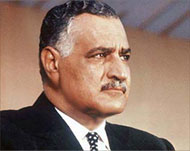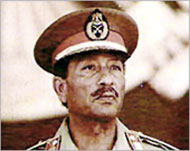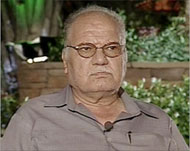A nadir for Arab League summits
Arab public opinion saw a good omen in the choice of Khartoum, Sudan’s capital, to host the Arab Summit 2006, the 18th such event.

The place brings to mind the sixth Arab League summit which was held in Khartoum in August 1967, two months after the Arabs were defeated in their second war with Israel which started on June 6, 1967 and lasted for six days.
At that summit, the defeated Arab leaders sent a message to the world that they would not surrender and that even if they lost a battle, they were still hoping to win the war.
The summit has been known since then for its three bold rejections: no peace, no negotiations, and no to the recognition of Israel.
This attitude gave Gamal Abd al-Nasir, then the pan-Arab Egyptian president and the leader of the Arab-Israeli duel, a boost to stir the nation to rise from the depression that prevailed after its defeat. Egypt launched a prolonged and sporadic war on Israel, which put a considerable stress on Israel’s military.
Although Nasir died in September 1970, the atmosphere of defiance continued and the Egyptian army crossed the Suez Canal in the 1973 war with Israel, which was the most important military victory the Arabs achieved in their 60-year struggle against Israel.
Arab solidarity persisted throughout the 1970s and 1980s but faltered in 1990 when Iraq invaded its tiny Arab neighbour, Kuwait. The issue of whether to ask for foreign assistance to drive the Iraqi forces out of Kuwait or not split Arab unity. The rift still exists.
Banned leader
In 2002, Arab leaders held their summit in Beirut. Israel banned Yasir Arafat, the late Palestinian leader, from leaving Palestine to attend; he gave his speech via a video link. Those at the conference, however, issued a peace appeal to Israel.
 |
|
Gamal Abd al-Nasir |
Israel responded to the initiative by attacking Palestinian cities in the occupied West Bank the next morning. Arabs everywhere were disappointed by their leaders’ weakness when they kept silent and did not withdraw their peace initiative.
In last month’s summit, Arab leaders tried to restore the defiant tone of 1967 by stressing three new rejections: no to ignoring the democratic choice of the Palestinian people, no to collective punishment, and no to unilaterally drawn borders. Strong speeches were made by several Arab leaders.
However, the summit ended by issuing no more than hopes and recommendations with no action on the ground to address any of today’s Arab crises – not even the main ones of Palestine and Iraq.
Requirements and challenges
Mahir al-Tahir, a member of the Palestinian Front for the Liberation of Palestine, said the official Arab stance does not meet the requirements and challenges of the day.
“I regret to say that some Arab regimes can be classified as collapsed and cannot speak, weak and afraid to speak or think for themselves, and collaborators with Arabs’ enemies,” he said.
“We really hope to see them taking action. We are sick and tired of gatherings ending with loose statements and foggy recommendations.”
Abd al-Barri Atwan, chief editor of the London-based al-Quds al-Arabi Arabic newspaper, went further. He said the conferences were not worth the money spent on them.
“It is really a pity to see the already financially troubled Sudan spend millions on a summit that did not do anything for its issues or the issues of their fellow Arabs,” Atwan said.
Flourishing decades
The political power under which Arabs flourished for decades during the last century has suffered several serious blows from which it seems unable to recover.
 |
|
Sadat signed the first Arab- |
Wamid Nadhmi, an Iraqi pan-Arab nationalist, says the scale of Arab solidarity has been declining since the Egyptian-Israeli peace treaty, and has recently reached a nearly irrevocable stage.
“The joint Arab political entity received a fatal blow when Egypt signed the peace treaty with Israel. President Nasir used to say Palestine before Sinai, but his successor, Anwar al-Sadat, flipped it over and exchanged Sinai for Palestine,” Nadhmi said.
“We have not seen the firm stances of the 1950s, 1960s or 1970s in the summits held in the past 15 years. Let us take the last summit in Khartoum, the Arab leaders agreed to raise money for Darfur, why didn’t they raise money for Hamas?
“They have enough money for both issues, and both issues are important, but of course not one of them dares to annoy the so-called big power.”
The failure of Arab leaders to protect Iraq, whether before or after the invasion, is one of the main reasons why the Arab people have lost faith in the summits.
Terrible mistake
“They plotted against Iraq in 1990, when they did not give themselves a chance to solve Saddam Hussein’s terrible mistake of invading Kuwait and went so fast to seek foreign aid – and here are the foreign troops; never gone from Arab soil since then,” Nadhmi said.
 |
|
Wamid Nadhmi says Arabs fear |
“The weakness of Arab leaders was well demonstrated in the 13-year sanction on Iraq; none of them had the guts to face the US and ask why the Iraqi people were being punished for something done behind their backs. Even Saddam’s cabinet did not know that the Iraqi army was invading Kuwait until the invasion day on August 2, 1990.
“I really do not know why they [Arab leaders] are meeting every year. I ask myself: ‘Don’t they know that they are helpless?'”
Atwan blames Arab countries for providing free assistance to the foreign forces that invaded Iraq in 2003 and for eventually leaving the country to fall prey to US and Iranian interests.
“Several Arab countries participated in the Iraq invasion; they opened their land and air space, paid money and gave all kinds of strategic and logistic support and yet they do not have a say whatsoever in today’s US-administered Iraq,” he said.
“It is a slap in their faces as Iran, which did not participate in the war on Iraq and sat relaxed watching Arab countries working against Iraq, is sitting now with the US to discuss its share in the cake, with the Arab countries watching.
“I think the recent Khartoum summit, which we had hoped would revive the spirit of that Khartoum summit of 1967, will have been the last Arab summit, because it has become a hopeless case.”